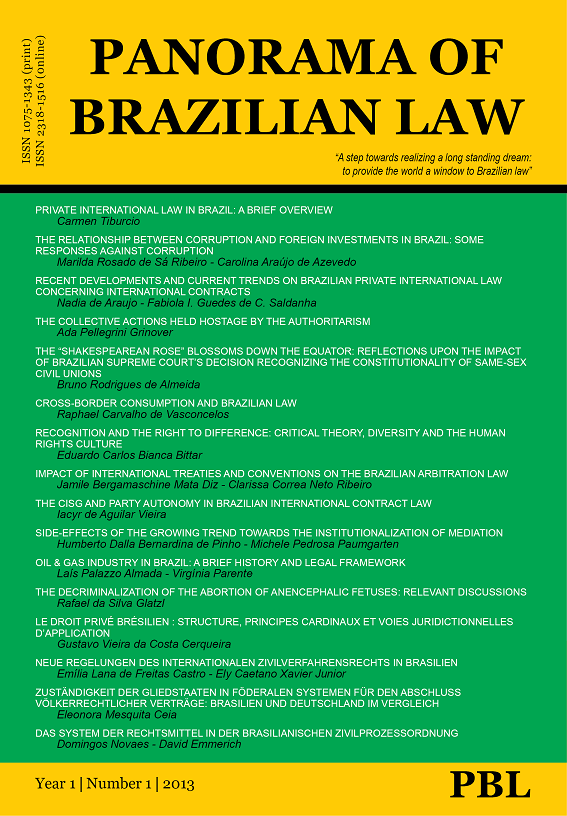THE COLLECTIVE ACTIONS HELD HOSTAGE BY THE AUTHORITARISM
Περίληψη
The judicial protection of collective interests represents, at the end of the millennium, one of the most impressive conquests of the Brazilian legal system. The transindividual interests which are particular to mass society are full of political relevance and, to that extent, are capable of transforming stratified judicial concepts. The recognition of these interests and the need to protect them have highlighted their political configuration in Brazil. In this way, the theory of public liberty forged a new “generation” of fundamental rights. In the same way, one can note that, at the constitutional level, the concepts of jurisdiction and litigation were renewed, while some fundamental guarantees were reformed. The most notable revolution, however, might have taken place in the procedural sphere, departing from an individual process model toward a social process model In Brazil, the Judiciary power has also taken advantage of class action lawsuits in terms of rationalization and work projection. The social objective of the judicial function was lost in view of the fragmentation and the pulverization of conflicts, always regarded as individual. There is a notable tendency to replace atomized decisions with a molecular treatment of litigation. Nevertheless, the Executive power has revealed itself to be inattentive to the reality of collective action and has tried to reduce its effectiveness, limiting access to courts, compressing the associative moment, and diminishing the role of the Judiciary. In this perspective, many years after the introduction of judicial protection for collective and diffuse interests in Brazil, the balance would have been positive, had the government not adopted an authoritarian line when applying legal treatment to the matter. It is possible to affirm that collective actions are a part of the current legal routine, despite the attacks which they suffer. The Judiciary power is significantly implanted in this context, it is conscious of its new role and of its renewed importance, and by way of its sentences, it was capable of occupying a position of leadership which points toward future challenges. The only note that rings false in this context is the attitude of the government with relation to the use of Provisional Measures to reverse such a situation, attacking collective actions and trying to diminish their efficiency in order to limit the access to Justice, to frustrate the associative moment and to make the Judiciary seem less important. The Legislative power, complacent or inattentive, has not been able to resist the attacks and to react to the attitudes of the government.Λήψεις
Δημοσιευμένα
2013-05-30
Πώς να δημιουργήσετε Αναφορές
Grinover, A. P. (2013). THE COLLECTIVE ACTIONS HELD HOSTAGE BY THE AUTHORITARISM. PANORAMA OF BRAZILIAN LAW, 1(1), 85–99. ανακτήθηκε από https://www.e-publicacoes.uerj.br/pbl/article/view/34360
Τεύχος
Ενότητα
Articles
Άδεια
Panorama of Brazilian Law employs Open Journal Access policies.
Authors are fully and exclusively responsible for their submissions.
Authors who publish with this journal agree to the following terms:
- Authors retain copyright and grant the journal right of first publication with the work simultaneously licensed under a Creative Commons Attribution-NonCommercial-ShareAlike 4.0 International License that allows others to share the work on a non-comercial basis with an acknowledgement of the work's authorship and initial publication in this journal and indicating if any changes were made. If you remix, transform, or build upon the material, you must distribute your contributions under the same license as the original.
- Authors are able to enter into separate, additional contractual arrangements for the non-exclusive distribution of the journal's published version of the work (e.g., post it to an institutional repository or publish it in a book), with an acknowledgement of its initial publication in this journal.

